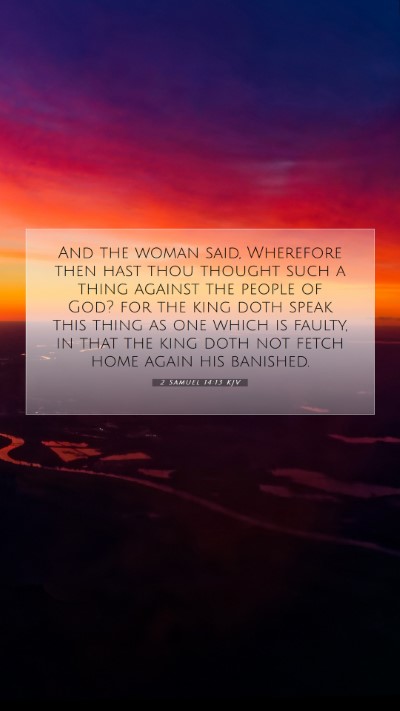Understanding 2 Samuel 14:13 - Bible Verse Commentary
The Bible verse 2 Samuel 14:13 presents a significant conversation that highlights themes of wisdom, justice, and the human condition, particularly within the dynamics of the family and the consequences of sin. In this verse, we find a statement from a wise woman who challenges the king on the matter of his son Absalom and the complexity of his judgment. The insight from public domain commentaries provides a deeper understanding of this passage.
Verse Context
2 Samuel 14:13 states:
"And the woman said, 'Why then have you devised such a thing against the people of God? For in speaking this word, the king is as one who is guilty in that the king does not bring back his banished one.'" (2 Samuel 14:13, NASB)
This exchange occurs during a pivotal moment when King David is reminded of his responsibilities toward his son, Absalom, who was estranged due to his involvement in the murder of his brother. The woman's words emphasize the moral obligation of the king as a leader and father.
Bible Verse Meanings - Insights from Commentaries
Matthew Henry's Commentary
According to Matthew Henry, this verse illustrates the importance of mercy and reconciliation. The wise woman, sent by Joab, highlights the inconsistencies in David's justice. While he mourns for his son, he fails to take action that could lead to Absalom's restoration. Henry emphasizes that God desires reconciliation, and this call for David to act reflects a deeper truth about divine mercy.
Albert Barnes' Notes on the Bible
Albert Barnes notes that the woman’s approach to the king is tactical and intelligent, using a parable to drive her point home. She points out the danger of the king’s inaction, suggesting that just as he erroneously allows for loss among his subjects, he has done the same in his family. Barnes highlights that the king’s failure to seek Absalom’s return showcases a breach of duty both as a ruler and father, reinforcing the theme of accountability in leadership.
Adam Clarke's Commentary
Adam Clarke reflects on the irony in the king’s situation and the depth of his grief. He indicates that the woman’s admonishment serves both as a plea for justice and an invitation for self-reflection on David’s part. Clarke points to the wisdom of the woman and her understanding of the king’s sorrow, feeling that the longing for reconciliation is universal. Her words expose David's failure to balance justice with mercy, a recurring theme in the theological narrative of the Old Testament.
Thematic Analysis
- Justice and Mercy: This passage underscores the tension between maintaining justice and extending mercy, a theme prevalent throughout Scripture.
- Wisdom in Counsel: The woman's eloquence demonstrates the effectiveness of wise counsel in influencing leadership decisions.
- Restoration and Reunion: The call for Absalom’s return is symbolic of God's desire for restoration among His people, reflective of the larger narrative of redemption in the Bible.
Application of the Verse
This passage prompts readers to consider how they deal with conflict, family estrangements, and the need for reconciliation in their own lives. Christians are encouraged to reflect on their responsibilities in leadership and relationships, seeking to embody principles of mercy and justice.
Cross References
- 2 Samuel 13:28-29 - The backstory of Absalom's actions.
- Luke 15:20 - The parable of the Prodigal Son and themes of forgiveness.
- Isaiah 1:18 - God's promise to reconcile and cleanse His people.
Conclusion
2 Samuel 14:13 speaks volumes about the complexities of human relationships and the divine expectation of reconciliation. By considering this verse within its broader context and through the lens of biblical commentators, we gain valuable insights into the nature of God's justice and mercy. For those studying the Scriptures, this verse serves as a tool for understanding how to interpret difficult Bible passages and apply their meanings to daily life.


